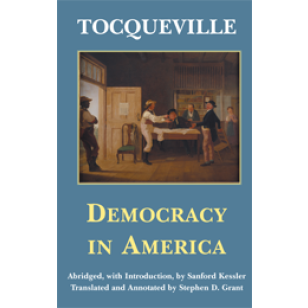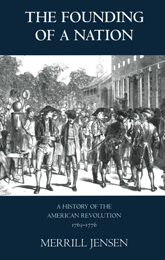Democracy in America
"A handy paperback edition offered primarily to teachers and students who can make no pretense of reading the entirety of the large work, but who want to sample some of its chief delights. . . . [Grant gives us an] exemplary translation . . . marked above all by great accuracy and fidelity to Tocqueville’s text. . . . Kessler’s editor’s Introduction is a model introduction to a classic text for today’s students. It is clearly written, compact (without being too short or dense), and nicely structured. . . . A tour—and translation—well worth the price of admission." —Paul Seaton, Perspectives on Political Science
eBook available for $11.95. Click HERE for more information.
This new abridged translation of Democracy in America reflects the rich Tocqueville scholarship of the past forty years, and restores chapters central to Tocqueville’s analysis absent from previous abridgments—including his discussions of enlightened self-interest and the public’s influence on ethical standards. Judicious notes and a thoughtful Introduction offer aids to the understanding of a masterpiece of nineteenth-century social thought that continues in our own day to illuminate debates about the roles of liberty and equality in American life.
Reviews:
“A handy paperback edition offered primarily to teachers and students who can make no pretense of reading the entirety of the large work, but who want to sample some of its chief delights. . . . [Grant gives us an] exemplary translation . . . marked above all by great accuracy and fidelity to Tocqueville’s text. . . . Kessler’s editor’s Introduction is a model introduction to a classic text for today’s students. It is clearly written, compact (without being too short or dense), and nicely structured. . . . A tour—and translation—well worth the price of admission.”
—Paul Seaton, Perspectives on Political Science
“A fine piece of work. Kessler has presented one of the best summaries of Tocqueville’s thought that I know of. The translation represents a clear improvement over both the Bradley translation and the Lawrence translation. In numerous cases, Grant has provided extremely useful notes covering the range of meanings and historical background of important concepts. Anyone teaching a course calling for selections from Tocqueville cannot do better than this volume.”
—Christopher Kelly, Boston College
"This is an excellent product—a major improvement over the other available versions. I will use it when I teach Tocqueville.”
—Donald T. Maletz, University of Oklahoma
About the Authors:
Sanford Kessler is Associate Professor of Political Science, North Carolina State University.
Stephen D. Grant received his M.A. in Political Science from the University of Chicago.
Contents:
Introduction, Editor’s Note, Translator’s Note
DEMOCRACY IN AMERICA, VOL. I:
Introduction
PART ONE:
THE POINT OF DEPARTURE AND ITS IMPORTANCE FOR THE FUTURE OF ANGLO-AMERICANS
The Reasons for Some Peculiarities Presented by the Laws and the Customs of the Anglo-Americans
THE SOCIAL STATE OF THE ANGLO-AMERICANS
That the Outstanding Feature of the Social State of the Anglo-Americans Is to Be Essentially Democratic; Political Consequences of the Social State of the Anglo-Americans
THE PRINCIPAL OF THE SOVEREIGNTY OF THE PEOPLE IN AMERICA
THE NECESSITY OF STUDYING WHAT HAPPENS WITHIN THE PARTICULAR STATES BEFORE DISCUSSING THE GOVERNMENT OF THE UNION
The Municipal System in America; The Limits of the Township; Powers of the Township in New England; The Township as an Individual Entity; The Municipal Spirit of New England; On the Political Effects of Administrative Decentralization in the United States
THE JUDICIAL POWER IN THE UNITED STATES AND ITS INFLUENCE ON POLITICAL SOCIETY
THE FEDERAL CONSTITUTION
The Advantages of the Federal System in General, and Its Special Utility for America
PART TWO:
Preface
HOW IT CAN BE STRICTLY SAID THAT IN THE UNITED STATES IT IS THE PEOPLE THAT GOVERN
PARTIES IN THE UNITED STATES
The Remnants of the Aristocratic Party in the United States
LIBERTY OF THE PRESS IN THE UNITED STATES
THE GOVERNMENT OF DEMOCRACY IN AMERICA
Universal Suffrage; The Choices of the People and the Instincts of American Democracy in Its Choices; Causes That May Partially Correct These Instincts of Democracy; The Corruption and the Vices of the Governors in Democracy; The Effects on Public Morality That Result from It
WHAT ARE THE REAL ADVANTAGES THAT AMERICAN SOCIETY DERIVES FROM DEMOCRATIC GOVERNMENT
The General Tendency of the Laws under the Dominion of American Democracy and the Instinct of Those Who Apply Them; Public Spirit in the United States; The Idea of Rights in the United States; Respect for the Law in the United States; The Activity Prevailing in All the Parts of the Political Body in the United States; The Influence That It Exercises upon Society
THE OMNIPOTENCE OF THE MAJORITY IN THE UNITED STATES AND ITS EFFECTS
How the Omnipotence of the Majority Increases, in America, the Legislative and Administrative Instability Which is Natural in Democracies; The Tyranny of the Majority; Effects of the Omnipotence of the Majority on the Arbitrary Power of American Public Officials; The Power That the Majority in America Exercises over Thought; Effects of the Tyranny of the Majority on the National Character of the Americans; The Courtier Spirit in the United States; The Greatest Danger to the American Republic Comes from the Omnipotence of the Majority
WHAT TEMPERS THE TYRANNY OF THE MAJORITY IN THE UNITED STATES
Absence of Administrative Centralization; The Spirit of the Legal Profession in the United States, and How It Serves as a Counterweight to Democracy; The Jury in the United States Considered as a Political Institution
PRINCIPAL CAUSES THAT TEND TO MAINTAIN THE DEMOCRATIC REPUBLIC IN THE UNITED STATES
The Influence of the Laws on the Maintenance of a Democratic Republic in the United States; The Influence of Mores upon the Maintenance of a Democratic Republic in the United States; Religion Considered as a Political Institution, and How It Serves Powerfully to Maintain a Democratic Republic among the Americans; The Indirect Influence That Religious Beliefs Exercise on the Political Society in the United States; The Principal Causes That Make Religion Powerful in America; The Laws Serve to Maintain a Democratic Republic in the United States More Than Physical Causes, and Mores Do So More Than Laws
SOME CONSIDERATIONS ON THE PRESENT STATE AND PROBABLE FUTURE OF THE THREE RACES THAT INHABIT THE TERRITORY OF THE UNITED STATES
The Present State and the Probable Future of the Indian Tribes That Inhabit the Territory Possessed by the Union; The Position Occupied by the Black Race in the United States; The Dangers That Its Presence Presents to the Whites; What Are the Chances of Survival of the American Union? What Dangers Threaten It?; On Republican Institutions in the United States; What Are Their Chances of Survival?; Some Considerations Concerning the Causes of the Commercial Greatness of the United States
VOL. II
Preface
PART ONE: INFLUENCE OF DEMOCRACY ON INTELLECTUAL ACTIVITY IN THE UNITED STATES
The Philosophic Method of the Americans
The Principal Source of Beliefs Among Democratic Peoples
How, in the United States, Religion Is Able To Make Use of Democratic Instincts
The Progress of Catholicism in the United States
How Equality Suggests to the Americans the Idea of the Indefinite Perfectibility of Man
Why the Americans Are More Devoted to the Practice of the Sciences Than to Their Theory
The Industry of Literature
Why the Study of Greek and Latin Literature Is Especially Useful in Democratic Societies
Some Particular Tendencies of Historians in Democratic Times
PART TWO: INFLUENCE OF DEMOCRACY ON THE SENTIMENTS OF THE AMERICANS
Why Democratic Peoples Show a More Ardent and More Lasting Love for Equality Than for Liberty
Individualism in Democratic Countries
How the Americans Combat Individualism by Free Institutions
The Use That the Americans Make of the Association in Civil Life
Relationships Between Civil and Political Associations
How the Americans Combat Individualism by the Doctrine of Interest Rightly Understood
How the Americans Apply the Doctrine of Interest Rightly Understood in Matters of Religion
The Taste for Material Well-Being in America
The Particular Effects That the Love of Material Pleasures Produces in Democratic Times
Why Certain Americans Display Such an Intense Spiritualism
Why the Americans Prove to Be so Uneasy in the Midst of Their Well-Being
How Religious Beliefs Sometimes Turn the Soul of Americans Toward Spiritual Pleasures
How, in Times of Equality and of Skepticism, It Important to Place the Goal of Human Actions at a Greater Distance
Why, Among the Americans, All Honest Occupations Are Considered Honorable
What Makes Almost All Americans Lean Toward Industrial Occupations
How Aristocracy May Emerge from Industry
PART THREE: INFLUENCE OF DEMOCRACY ON MORAL HABITS PROPERLY SO-CALLED
How Moral Habits Become Milder as Conditions Become More Equal
Influence of Democracy on the Family
The Education of Young Women in the United States
How the Young Woman Reappears in the Features of the Wife
How Equality of Conditions Contributes to the Maintenance of Good Morals in America
How the Americans Understand the Equality of Man and Woman
How the Aspect of Society, in the United States, is at Once Agitated and Monotonous
Why There Are So Many Ambitious Men and So Few Great Ambitions in the United States
Why Great Revolutions Will Become Rare
PART FOUR: ON THE INFLUENCE THAT DEMOCRATIC IDEAS AND SENTIMENTS EXERT ON POLITICAL SOCIETY
Equality Naturally Gives to Men the Taste for Free Institutions
That the Ideas of Democratic Peoples Regarding Government Are Naturally Favorable to the Concentration of Powers
That the Sentiments of Democratic Peoples Accord with Their Ideas in Leading Them to Concentrate Power
What Kind of Despotism Democratic Nations Have to Fear
Continuation of the Preceding Chapters
General View of the Subject
Select Bibliography
View Excerpt...





